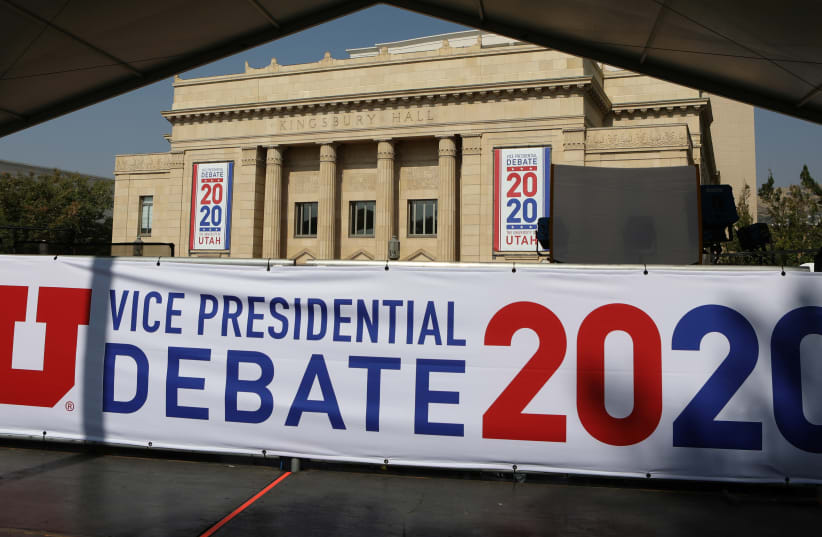WASHINGTON – Vice President Mike Pence and Democratic vice presidential nominee, Kamala Harris, will face off on Wednesday night in Salt Lake City, Utah, in an event that will look different from any other vice presidential debate.
Most notably, there is the visual element: Plexiglass will separate Harris and Pence from each other and the moderator. In addition, Politico reported that the two would be seated 4 meters apart instead of 2 meters. Pence’s spokeswoman Katie Miller told Axios: “If Sen. Harris wants to use a fortress around herself, have at it.”
And while the topics for the debate are yet to be released, COVID-19 is expected to be the main topic of the evening, as Pence is leading the White House coronavirus task force. The debate will take place in the shadow of President Donald Trump’s recovery at the White House after testing positive last week, followed by a three-night hospitalization.
David Zarefsky, professor emeritus at Northwestern School of Communication, told The Jerusalem Post that the vice presidential debates have often been interesting to watch and have enabled viewers to learn about candidates they might not have known very well, but none of them has made any difference to the campaign or the results.
“This year’s debate has the potential to be a larger influence, because of the age of the presidential candidates, the state of the president’s health and uncertainty about whether the two remaining presidential debates will take place,” he said.
Thomas Hollihan, professor of communications at USC Annenberg School for Communication and Journalism, told the Post that in most past campaigns, the vice presidential debates have not mattered very much.
“In this election, however, I think this debate will draw a large audience and likely matter due to the advanced age of the presidential candidates and, of course, Trump’s COVID diagnosis,” he said.
“I expect the public is very curious to know how Pence will attempt to defend the administration’s handling of the virus since he was the man put in charge of that effort, and the US has seen so many deaths,” Hollihan said. “The administration had been desperate to turn public attention away from the virus, but obviously that is not likely to happen now.”
Josh Kraushaar, political editor for National Journal, told the Post that vice presidential debates typically don’t alter public opinion much, but this will be significant for other reasons.
“Vice President Mike Pence will be under political pressure to make the case to more traditional Republican voters that the president deserves another term, even as a majority of Americans are alarmed over his handling of the pandemic – and his erratic behavior after his own coronavirus diagnosis,” he said.
Tammy Vigil, associate professor of communication studies at Boston University and a presidential debate expert, told the Post that the public usually sees the vice presidential debate as a chance to get to know the person who might be “a heartbeat away from the presidency” a bit better.
“In most years, the idea of presidential ascension is not particularly prominent in voters’ minds, but it is likely to be more impactful as there are two elderly men at the top of the tickets, and Trump’s COVID diagnosis raised questions about fitness for office,” she said.
Usually, the vice presidential debates are the attacking debates, so they are sometimes memorable for the aggressiveness a candidate shows, Vigil explained.
“This started way back in the 1976 VP debates when [Republican] Bob Dole solidified his nickname as the ‘hatchet man’ for his aggressive tactics against Walter Mondale. They rarely make much impact on the actual polling, and it is unclear if they really move voters’ actions beyond possibly energizing a base,” she added.
“However, the 2020 VP debate is likely to be much more substantive than the presidential debate, and will include attacks, but not of the extreme nature of the presidential debate,” she continued.
Vigil noted that the more memorable debates are the unusual ones, like 1984, when a woman, Democrat Geraldine Ferraro, was first nominated for vice president. “Ferraro was called ‘feisty’ for some of her responses even though they were not particularly assertive,” Vigil said.“In 2008, [Republican] Sarah Palin had become something of a pop culture phenomenon and attracted viewers, and in 1992, there were three VP candidates on stage at the same time. [Independent] Ross Perot’s running mate, Adm. James Stockdale, began with the line ‘who am I and why am I here?’ which did not come across as intended. There are also one-liners that are memorable, such as 1988 when [Democrat] Lloyd Bentsen famously said to Dan Quayle ‘You’re no Jack Kennedy.’”
